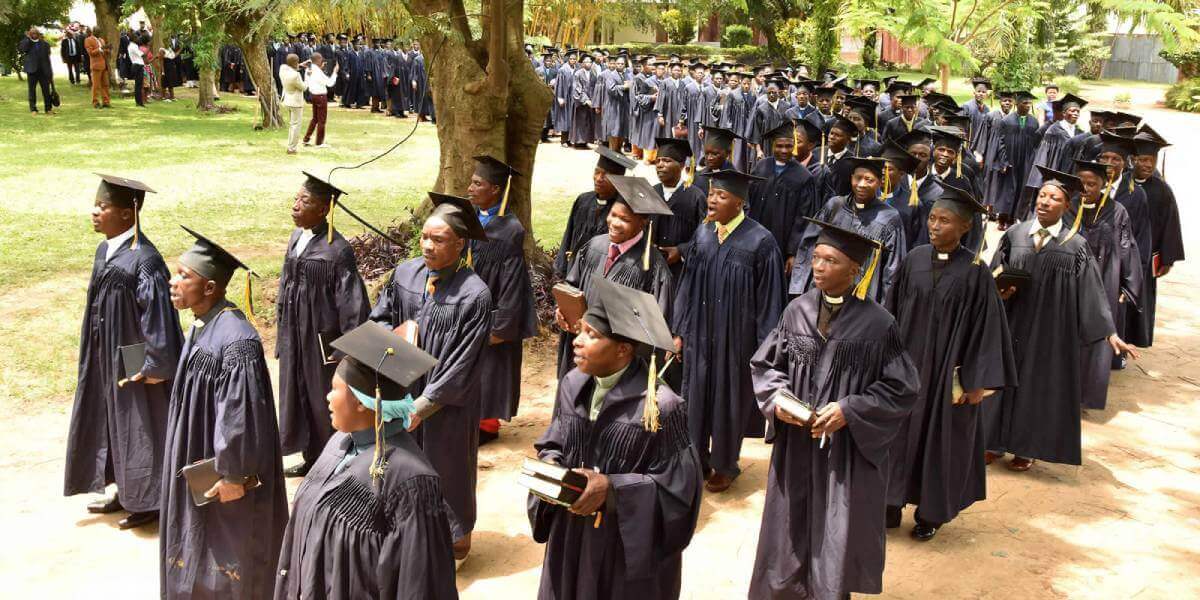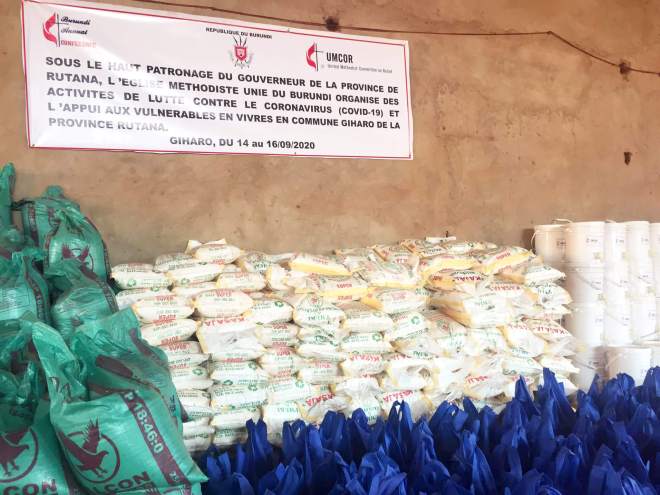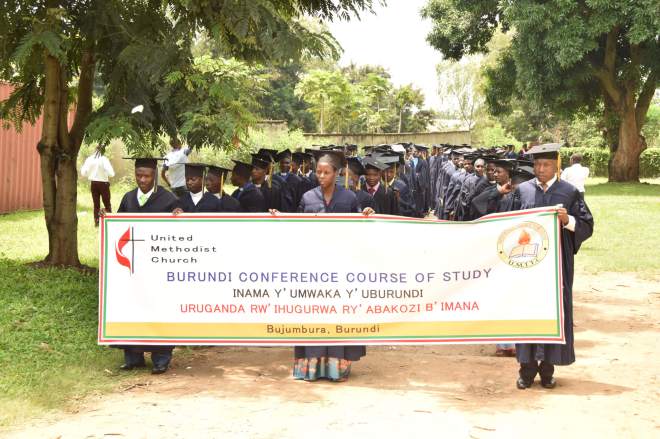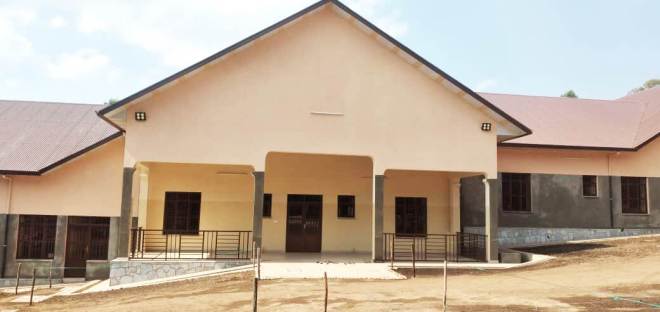
By Christie R. House
October 2020 | ATLANTA

Made possible by the Burundi Annual Conference and an UMCOR COVID-19 Rapid Response grant. PHOTO: PATRICK ABRO
The Rev. Jean Ntahoturi, legal representative for The United Methodist Church in Burundi, reports that the conference has reached several milestones in its journey toward full reconciliation. In February 2018, two United Methodist groups held a special annual conference to formalize the details of the church’s reunification after 12 years of separation.
During that conference, delegates raised the issue of theological training for clergy and lay pastors in Burundi, a country that has no United Methodist seminary. Many candidates from both groups had been ordained without having formal theological training.
A second concern was raised about the United Methodist hospital in Kayero. The hospital began construction in 1991, but the civil war in 1993 interrupted the work before it was completed. In the intervening years, the abandoned hospital was occupied and then vandalized and looted. Today, the nearest referral hospital is 28 miles away, too far for the sick and injured to reach by foot, their main means of transportation.
Ntahoturi and Zephirin Ndikumana, the Burundi UMC lay leader (both graduates of Africa University), and the leadership team developed by the reunified church have worked tirelessly to prepare the groundwork for a smooth transition. They’ve planned each step along the way and created opportunities for fellowship and conversation. They continue to guide the church as it takes on more responsibility and reconnects with Methodists around the world.
The global United Methodist Church has offered support and expertise to assist the Burundi conference with education and rebuilding. Contributors include Global Ministries – through Global Health and the United Methodist Committee on Relief, the General Board of Higher Education and Ministry, the Virginia Annual Conference and Ginghamsburg United Methodist Church in the West Ohio Annual Conference.
Equal access to theological education

February 29, 2020., Bujumbura, Burundi. PHOTO: DAVID SCOTT
“All pastors who had not received theological training were to undergo a Course of Study and that has since been achieved,” Ntahoturi confirmed in a recent letter to Thomas Kemper, Global Ministries former general secretary. In February, 192 pastors graduated from the course. “This was achieved through a stern commitment of the global church under the leadership of men and women who worked tirelessly to ensure that financial and academic support were secured,” he said.
Dr. David Scott, Global Ministries’ director of theology, was both an instructor and a Global Ministries representative at the last sessions of the Course of Study. The full school offered 16 courses in five sessions. Instructors came from the General Board of Higher Education and Ministry, Global Ministries, the West Ohio and Virginia conferences, the African Association of United Methodist Theological Institutions and the Burundi Conference.
The Rev. Shannon Conklin-Miller and the Rev. Dr. Beauty Maenzanise, from the General Board of Higher Education and Ministry, worked with colleagues in Burundi to develop a Course of Study program specifically for Burundian pastors.
“GBHEM was thrilled to help create and implement the first Burundian Course of Study program 2019-2020. I was honored to take part in it and it’s been exciting to see how the graduates are already using their training to pastor in their communities,” said Conklin-Miller, the associate general secretary of GBHEM’s Division of Ordained Ministry.
Maenzanise, based at Africa University, is the manager of Global Formation for New Spiritual Leaders with GBHEM. “First and foremost,” she said of the Course of Study, “the fact that the participants were from both sides ushered in the spirit of oneness, which is one of the main fruits of reconciliation. The completion of the Course of Study brought with it dignity and respect for the ordained ministry in The United Methodist Church, not only in Burundi, but globally.”
The Course of Study also created space for pastors to fellowship across the two groups. “There was this overwhelming sense that, not only had the pastors received training over the course of these five sessions, they were able to form new relationships,” Scott explained. “Reconciliation really happened as they studied together, ate together and lived together throughout the sessions.”
Global Health helps to refurbish a hospital

PHOTO: PATRICK ABRO
“The second resounding success,” Ntahoturi continued in his letter, “is the renovation of the Kayero hospital, inaugurated as the Bishop Jean Alfred Ndoricimpa Memorial Hospital. The work on the hospital was completed at the end of July 2020, defying the interferences of the COVID-19 pandemic.”
Global Health staff visited Burundi early in 2019 to meet with Dr. Aloys Nyabenda, the health coordinator for the Burundi UMC. Together they mapped out the necessary steps to reconstruct the Kayero hospital from the ground up, fulfilling a promise made to the community almost 30 years ago.
Megan Klingler, a program manager for Global Health, said that as the construction phase comes to an end, Global Health will continue its relationship and commitment to the hospital. Nyabenda has recently submitted a proposal for medical equipment needed to outfit the newly revitalized hospital.
Ntahoturi noted that the hospital reconstruction also caught the attention of government officials in Burundi. “The hospital is very beautiful,” he said. “The Ministry of Health was surprised by our church making such a bold move. This has earned our church more respect and consideration from the government.”
Patrick Abro, a Global Ministries missionary from Côte d’Ivoire, accepted a new post in Burundi early in 2020 as the health operations manager, working alongside the Burundi UMC Health Board. This year he has helped to organize and implement several major community health programs, including one with Imagine No Malaria through Global Health and a second Global Health grant to disseminate essential information about COVID-19 prevention to pastors and schools. Those trained by the program will train others in their communities. An UMCOR Sheltering in Love grant assisted the conference in providing hand-washing stations, which were distributed throughout the areas targeted by the campaign. The UMCOR grant also provided grains and other food stocks for families that are struggling because of displacement, discrimination and disability. An UMCOR Water, Sanitation and Hygiene grant in Ryuigi province increased access to safe drinking water in the communities and improved latrines, sanitation and hygiene practices at local churches.
“Child and maternal needs are particularly acute in Burundi, as is prevention of diseases such as measles, malaria, AIDS, cholera, diarrhea and COVID-19,” Abro said. The health board in Burundi is working to expand services to cover communities trapped in poverty and a growing number of people displaced by civil unrest.
Reducing conflict and increasing trust
Graduation day for the Course of Study school was a joyous occasion. It represented another success for a church that has accomplished much in the past two years.
“People have come together around a sense of being a reunified UMC in Burundi,” said Scott. “Things are starting to happen now. They are engaged in new projects. There is a real sense of forward momentum that is entwined with the reconciliation and the Course of Study program.”
Bishop Daniel Wandabula, episcopal leader for the East Africa area, attended the graduation and so did the former leaders of the two separate groups. Ntahoturi noted that this was a sign, not only that people were graduating with an educational degree, but that the two parts of the church were coming together as one with support from their previous leaders.
The Burundi Conference Leadership Team has been regularly visiting with pastors in their home churches to see how the pastors’ training is being implemented. Laurence Nkurunziza, a newly appointed pastor, said that Christian Education and Discipleship have become her priority. She has established Sunday schools for adults and children and various sessions of organized Bible study. She is convinced that the knowledge of God in the church will reduce conflicts and increase trust and unity among church members.
Christie R. House is a consultant writer and editor with Global Ministries.

